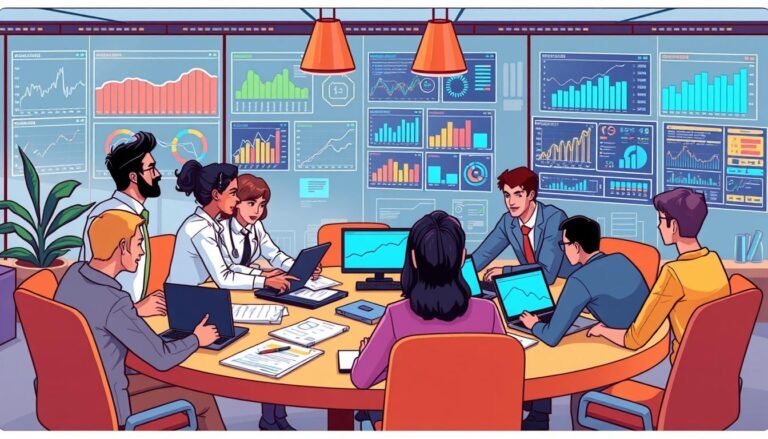Stress Management for HR Professionals
In today’s fast-paced work world, HR pros face unique stressors. A UK study showed 79% of HR folks felt job stress negatively. This calls for urgent stress management and wellness programs in HR.
HR roles have grown complex, with fast changes and many projects leading to burnout. In fact, 71% of HR leaders found 2020 the most stressful year. This stress harms not just HR folks but also the departments and companies they work for.
To tackle these issues, HR pros must focus on work-life balance and preventing burnout. By using good stress management, HR leaders can boost their health and set a positive example for everyone. This can lead to better productivity, job happiness, and overall company health.
Key Takeaways
- HR professionals face significant stress, with 79% reporting negative job impacts
- Rapid change management and multiple projects contribute to HR burnout
- Employee wellness programs are crucial for stress reduction
- Work-life balance strategies can improve HR professionals’ well-being
- Effective stress management benefits both HR leaders and the entire organization
Understanding Stress in the HR Context
HR professionals have it tough, handling many tasks and dealing with complex relationships. A study found that 84% of HR leaders often feel stressed, with 81% feeling burned out. Yet, 57% still love their jobs in HR.
The Unique Challenges Faced by HR Professionals
HR roles are all about managing people, balancing policies with employee needs, and keeping secrets. This emotional work can be very stressful and lead to burnout. That’s why Resilience Training is key for HR to handle these challenges.
Common Stress Triggers in HR Roles
HR professionals face several stressors, including:
- Managing many projects and demands
- Struggling with work-life balance
- Lack of support from management
- Fast changes in the organization
The Impact of Stress on HR Functionality
Stress really hurts HR’s productivity and happiness. A big 66% of HR folks worry about their industry’s future. Using Mindfulness Techniques can help reduce these worries and boost well-being.
| Stress Impact | Percentage |
|---|---|
| Work-related ill health cases due to stress | 51% |
| Annual productivity loss due to employee disengagement | $8.1 trillion |
| Americans citing work as a significant stress source | 65% |
To tackle these issues, companies are now focusing on Mental Health Support. Good stress management boosts individual health and improves HR and company performance.
Recognizing Stress Symptoms
Stress in HR professionals can show up in many ways. It’s key to know these signs to keep Emotional Intelligence high and use good Relaxation Methods. Let’s look at how to spot stress at work.
Physical Signs of Stress in HR
HR folks often feel physical stress signs. These can be constant tiredness, headaches, and trouble focusing. Some might notice changes in how much they eat or sleep. Paying attention to these body signals is vital for doing well at work.
Emotional and Behavioral Indicators
Emotional stress signs in HR roles are just as important. These can include feeling cynical, irritable, or overwhelmed. Mood swings and always feeling negative about work are common. Spotting these emotional changes helps keep the work environment balanced and prevents burnout.
Assessing Stress Levels in the Workplace
Checking workplace stress involves many factors. HR can use feedback from employees, look at productivity, and watch team dynamics. This helps create specific Conflict Resolution plans and stress management programs.
“Problems at work are more strongly associated with health complaints than any other life stressor—more so than even financial or family problems.” – St. Paul Fire and Marine Insurance Co.
Knowing these stress signs lets HR tackle issues early. This creates a healthier work place. By spotting stress early, HR can help employees and keep the organization healthy.
The Importance of Stress Management
Stress management is key in the HR field. It’s not just about personal well-being. It’s about making the workplace healthier and more productive for everyone. Let’s look at why stress management is important and its wide-ranging effects.
Why Stress Management Matters for HR
HR professionals deal with unique challenges every day. The American Psychological Association says job stress costs U.S. employers $300 billion a year. This shows how urgent it is to manage stress well. By using Employee Wellness Programs, HR can tackle this issue, helping both individuals and the company.
The Impact on Employee Relations
Stress management affects employee relations. A study shows 83% of workers face work stress, with 77% experiencing it in the last month. This can lower productivity and increase conflicts. By promoting Work-Life Balance Strategies, HR can create a better work environment. This improves communication and trust among team members.
Benefits for Organizational Health
Good stress management is great for the organization’s health. Research indicates 57% of stressed employees are disengaged at work. By focusing on Burnout Prevention, HR can increase productivity, reduce turnover, and boost innovation. Companies that manage stress well attract top talent and stay ahead in the market.
| Stress Management Benefits | Percentage |
|---|---|
| Improved mental health with flexible work | 39% |
| Reduced absenteeism (1-2 days/year) | 54% |
| Increased productivity (1+ hour/day) | 34% |
Effective Stress Management Techniques
HR professionals face unique challenges that can lead to high stress levels. Let’s explore some powerful strategies to manage stress effectively.
Mindfulness and Meditation Practices
Mindfulness techniques are proven stress-busters for HR professionals. A recent study found that practicing meditation and deep breathing exercises can significantly boost resilience in the HR field. These practices offer a much-needed break during hectic workdays.
Time Management Strategies
Efficient time management is crucial for reducing stress. The Eisenhower Matrix helps prioritize tasks, while the Pomodoro Technique improves focus and productivity. Batching similar tasks can also streamline your workday.
| Strategy | Benefit | Implementation |
|---|---|---|
| Eisenhower Matrix | Task Prioritization | Categorize tasks by urgency and importance |
| Pomodoro Technique | Improved Focus | Work in 25-minute intervals with short breaks |
| Task Batching | Increased Efficiency | Group similar tasks for focused completion |
Building Resilience through Adaptability
Resilience training is key to thriving in the ever-changing HR landscape. Developing emotional intelligence and mastering difficult conversations using the COIN method can enhance adaptability. Regular check-ins with employees foster a supportive work environment.
The CALM framework (Communicate effectively, Allocate time wisely, Limit emotional exhaustion, Mindfulness in action) offers a comprehensive approach to stress management. By implementing these strategies, HR professionals can create a healthier work-life balance and provide better mental health support for their teams.
Creating a Supportive Work Environment
A supportive work environment is key to reducing stress and boosting productivity. HR professionals play a crucial role in shaping workplace culture and implementing effective strategies.
Fostering Open Communication
Open communication is vital for a healthy workplace. HR can encourage this by setting up regular check-ins and wellness surveys. These tools provide valuable insights into employee morale and help identify areas for improvement.
Providing Resources for Mental Health Support
Mental health support is essential in today’s workplace. Companies that actively support mental health see higher employee retention rates. In fact, 61% of employees are more likely to stay with a company that prioritizes mental well-being.
- Offer mental health days to prevent burnout
- Include mental health metrics in performance reviews
- Provide access to professional counseling services
Promoting Work-Life Balance Strategies
Work-life balance is crucial for reducing stress. Flexible work arrangements, such as remote work or variable hours, contribute significantly to employee well-being. This is especially important in areas with heavy traffic and long commutes.
| Strategy | Benefit |
|---|---|
| Flexible work hours | Reduces commute stress |
| Remote work options | Improves work-life integration |
| Wellness programs | Boosts overall employee health |
By implementing these strategies, HR professionals can create a supportive environment. This environment promotes employee wellness, work-life balance, and mental health support. Regular assessment and adjustment of these programs ensure their ongoing effectiveness and relevance.
Training and Development for HR Professionals
HR professionals face many challenges today. They need special training to handle stress and improve their work. These programs teach them how to manage workplace pressures well.
Workshops on Stress Management
Stress management workshops are crucial for HR teams. They learn about healthy habits, nutrition, and stress-reducing activities. A study found that employees who took part in these programs were sick 34% less often.
This shows how important these workshops are. They help reduce absenteeism and increase productivity.
Building Emotional Intelligence
Emotional Intelligence is vital for HR success. It means knowing your own feelings and understanding others’. Training in this area helps HR professionals deal with workplace challenges better.
It’s key for creating a supportive work culture. It also improves team dynamics.
Skills for Conflict Resolution
Conflict Resolution skills are essential for HR. Training focuses on listening, empathy, and solving problems. These skills help HR professionals handle disputes well.
In one case, a hospital saw a 70% drop in malpractice claims. This shows the effectiveness of such training.
Resilience Training
Resilience Training helps HR professionals recover from setbacks. It teaches stress management and adaptability. This training is vital as 40% of workers find their jobs very stressful.
By building resilience, HR teams can better support themselves and their colleagues.
| Training Area | Key Benefits | Impact on HR |
|---|---|---|
| Stress Management | Reduced sick days, improved health | 34% fewer doctor visits |
| Emotional Intelligence | Better team dynamics, supportive culture | Enhanced employee relations |
| Conflict Resolution | Fewer workplace disputes | 70% decrease in malpractice claims |
| Resilience Training | Improved stress coping mechanisms | Increased productivity, lower burnout rates |
Continuous learning in these areas helps HR professionals manage their stress. It also helps them support employees better. By investing in these programs, organizations can create a healthier, more productive workplace.
Utilizing Technology for Stress Reduction
In today’s fast-paced HR world, technology is key for managing stress and boosting efficiency. With 79% of HR managers finding their job very stressful, digital tools are vital for Employee Wellness Programs and Mental Health Support.
HR Software Solutions for Workload Management
HR software makes processes smoother, cutting down on paperwork. It automates tasks like payroll and recruitment, boosting productivity. Online systems for tracking applicants widen the talent pool and save time.
These tools let HR teams concentrate on training and development. This is crucial for their growth.
Apps for Mindfulness and Relaxation
Mindfulness Techniques are now easy to access. Apps offer guided meditations and relaxation exercises. They help HR professionals manage stress anytime, anywhere.
Online Support Groups and Training
Virtual platforms are rich in resources for managing stress and professional growth. They connect HR professionals, creating a sense of community. Digital training programs improve skills in areas like compliance and performance evaluation.
This reduces stress at work.
| Technology Solution | Stress Reduction Benefit |
|---|---|
| Payroll Automation | Increases accuracy and efficiency |
| Applicant Tracking Systems | Saves time in recruitment processes |
| Performance Metric Software | Tailors evaluations to individual needs |
| Mobile Workforce Management | Facilitates remote work management |
Promoting Team-Building Activities
HR professionals are key in making the workplace better. Team-building activities help with employee wellness and mental health. They make coworkers closer and the workplace more united.
Importance of Team Cohesion
Good team cohesion means better communication and work. A Gallup study shows engaged employees can make a company 200% more productive. This shows how important team-building is for a great work culture.
Organizing Stress-Relief Events
Stress-relief events are key for work-life balance. Fun activities like virtual cooking classes and trivia games help team members relax and bond. These activities lower stress and boost teamwork and creativity.
Encouraging Social Interactions
Social interactions are essential for a supportive work place. Icebreakers help team members talk and get to know each other. Regular social events make the workplace positive and improve employee well-being.
| Activity | Benefits |
|---|---|
| Virtual Cooking Classes | Stress relief, teamwork, creativity |
| Trivia Games | Improved communication, unity |
| Icebreakers | Building rapport, sparking conversations |
HR professionals can make the workforce more engaged and productive with team-building activities. Remember, celebrating team wins is important for keeping employees engaged.
Leading by Example: HR Role Models
HR leaders are key in shaping the workplace culture. They show healthy stress practices, setting the tone for everyone. This creates a positive work environment and supports well-being.
Demonstrating Healthy Stress Practices
HR professionals can lead by example in many ways:
- Practicing work-life balance strategies openly
- Participating in resilience training programs
- Utilizing mental health support services
These actions help HR leaders and inspire employees to value their well-being. Studies show leaders who act as role models create a culture of accountability. This encourages responsibility in the team.
Sharing Personal Stress Management Stories
Sharing personal stress management experiences can be very powerful. When HR leaders open up, it makes talking about mental health normal. It also gives practical tips to others. This openness builds trust and supports a caring workplace culture.
Encouraging Peer Support
HR can support peer support in several ways:
- Mentoring programs
- Support groups focused on stress management
- Team-building activities that foster connections
These efforts build a network of help and understanding. Research shows leaders who face challenges and adapt inspire their teams. This builds a resilient workforce.
| Initiative | Impact |
|---|---|
| Work-Life Balance Strategies | 20-30% reduction in manager workload |
| Mental Health Support Programs | £119 billion potential cost savings to society |
| Resilience Training | Improved employee productivity and morale |
By using these strategies, HR leaders can make a workplace where stress management is a priority. This leads to a healthier and more productive team.
Evaluating the Effectiveness of Stress Management Initiatives
It’s key for HR pros to check if Employee Wellness Programs work. By looking at results, we can make our Mental Health Support and Burnout Prevention better. Let’s see how to check these efforts well.
Tracking Employee Feedback
Regular surveys are great for seeing how stress and program success are doing. HR teams can use this info to make their plans better. For instance, 88% of workers feel happier at their jobs after stress management programs start.
Measuring Stress Reduction Outcomes
Important stats include how often people are absent, how productive they are, and how engaged they feel. Companies with good stress management see a 54% drop in mental health claims. This shows how these programs help employee well-being.
Adapting Strategies Based on Results
Use data to make your plan better. If peer support groups help 67% of HR folks, think about growing these groups. Remember, stress plans at work should change based on feedback and results.
| Metric | Impact |
|---|---|
| Job Satisfaction | 88% improvement |
| Mental Health Claims | 54% reduction |
| Peer Support Effectiveness | 67% stress reduction |
By always checking and tweaking stress management efforts, HR folks can make workplaces healthier and more productive. This method ensures Employee Wellness Programs really help the workforce.
Continuing Education on Stress Management
It’s key for HR pros to keep up with stress management. Learning new techniques helps make work places healthier and more productive. Let’s look at ways to improve your skills in this area.
Staying Updated with Trends and Techniques
HR folks can stay sharp by using different methods. Online courses, webinars, and industry news are great for learning the latest. For example, Resilience Training is popular, with 97% of people reaching work goals after it.
Networking with Other HR Professionals
Connecting with others is super helpful. Go to conferences, join online groups, or be part of professional groups. These places are great for sharing tips and solving problems related to mental health at work.
Seeking Certification in Stress Management
Getting certified boosts your skills and trustworthiness. Many programs teach Emotional Intelligence and how to reduce stress. For example, some courses offer:
- 24/7 access to learning materials
- Expert-led instructional videos
- Flexible study options
- Certification upon completion
Investing in stress management education is worth it. Studies show 94% of people keep using stress tools two months later. This leads to a 24% boost in productivity.
| Benefit | Percentage |
|---|---|
| Improved work objective achievement | 97% |
| Continued use of stress management tools | 94% |
| Increased productivity | 24% |
| Recommend program expansion | 99% |
By focusing on stress management education, HR pros can greatly improve work place well-being and success.
Conclusion: Prioritizing Well-Being in HR
HR professionals are key in shaping the workplace culture and employee well-being. With 52% of HR folks feeling stressed, managing stress is vital. Employee wellness programs are now a must for a healthy work environment.
Committing to Ongoing Stress Management
Work-life balance strategies are crucial to fight burnout. Companies like LinkedIn and HubSpot have started mental health days. This move has cut turnover rates by 59%, showing happy employees stay longer.
Encouraging a Culture of Support
Creating a supportive culture begins with talking openly about mental health. Peer support groups help fight loneliness and boost spirits. This way, HR can tackle the 35% who often feel stressed at work.
Looking Ahead: Enhancing HR Practices
The future of HR is about always improving well-being efforts. With 68% of HR focusing on well-being, it’s important to keep strategies fresh. By focusing on burnout prevention and new ideas, HR can build strong, engaged teams.
Source Links
- Stress Management in HR: Tips for HR Leaders | Nivati
- The Ultimate Guide to Stress Management for HR Professionals: Strategies for a Healthier Workplace
- Seven ways HR teams can manage stress in the workplace – Ciphr
- Putting Your Oxygen Mask on First: How Leadership Coaching Supports Stress Management for HR Professionals
- Understanding and Supporting Each Stressed Worker – Gallantium
- Workplace Stress: Causes, Consequences, & Coping Strategies
- STRESS…At Work (99-101) | NIOSH
- Coping with stress at work
- Causes and signs of stress – Managing work-related stress
- The Important Role HR Plays in Reducing Workplace Stress | JWU CPS
- Stress management in the workplace: A guide for HR and benefits leaders
- Stress Management Techniques for HR Professionals: Navigating the Challenges with Confidence
- What Managers Can Do to Ease Workplace Stress
- Supporting Stressed Employees: Essential Tools for Managers and HR
- A Guide for HR Professionals to Support Employee Well-being – International HR Institute
- What are some effective ways to manage stress in HR Training and Development?
- You’re an HR professional. How can you help employees manage stress?
- Cut the Stress
- How Technology Helps Reduce Stress For HR Teams
- How Technology Helps In Reducing Stress for HR Team | EffortlessHR
- 10 Effective HR Team Building Activities for HR | Confetti 🎉
- 16 HR Team Building Activities to Spark Employee Engagement
- Leading by Example: Empowering Organizations and Teams Through Action
- Employee Stress: A Helpful Resilience Guide for HR Managers and Company Directors
- Why managers need to lead by example to protect staff wellbeing
- Fixing Workplace Stress Management for Lasting Results
- 10 Strategies To Manage Stress At Work | Wellable
- Stress Management
- Stress Management in the Workplace
- How Employee Stress Impacts Productivity – CCSU
- HR – Stress Management and Mental Wellbeing at Work
- Prioritizing HR Well-Being: The Key to a Thriving Workplace Culture
- Prioritizing Employee Wellbeing and Mental Health: HR’s Vital Role
- "HR’s Role in Employee Wellbeing and Mental Health: Cultivating a Supportive Workplace Culture" – GHRC LLP








